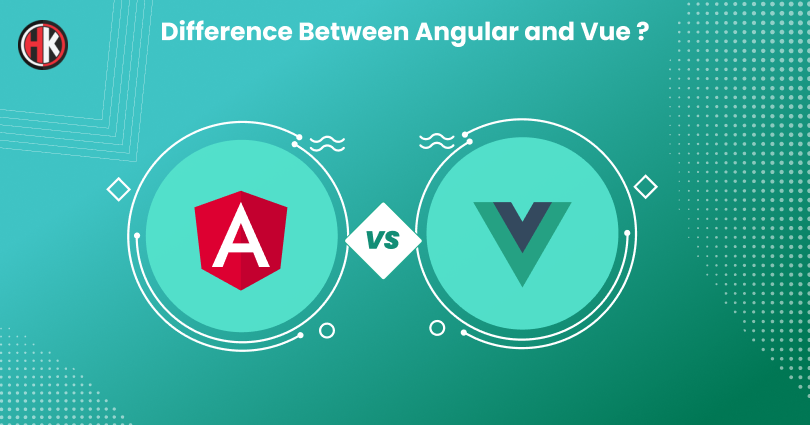
Ever since jQuery was released for building interactive web apps, JavaScript frameworks such as Angular vs Vue have evolved very quickly over the past few years. And since then, there has been a trend for developing organized frontend frameworks.
This evolution made it possible to relate the concept of Single-Page Applications (SPA) – web apps that rewrite web pages without loading the entire page from scratch.
As SPAs have already caught the attention of users, the evolution of front-end frameworks granted a long-term stable web framework – Angular. A standalone frontend framework with most things built in without compromising the size or speed.
In 2014, a member of the Angular team at Google, Evan You, released Vue – a progressive frontend framework to build complex user interfaces that can be used especially for creating views.
Here in the blog, we have mentioned the two frameworks, i.e., Angular vs Vue. Both are front-end JavaScript frameworks with huge capabilities. This head-to-head comparison will help you identify the best front-end framework to choose in 2023.
Table of Contents
Angular vs Vue: An Overview

What is Angular?
Angular is a typescript-based JS framework that helps businesses build innovative web applications. It is a front-end framework with in-built tools and libraries that don’t limit the size or speed of the web app.
It provides app development opportunities across all platforms through its reusable code that can be used for any deployment task. It has a dynamic UI binding and a two-way data binding that is essential to its architecture.
Angular was released in 2016, a complete rewrite of the 2010 Angular. The framework was developed by Misko Hevery and the Angular team at Google. It is the same team that handles the framework today, along with external developers.
Angular is good for:
- Dynamic applications
- UI and UX-centered projects
- Portfolios and image-heavy websites
- Single-page applications
What is Vue?
Vue is a lightweight front-end JS framework that provides advanced web tools to develop modern front-end web applications and SPAs. It is also considered an adaptable and progressive JavaScript framework because it allows modification of code without affecting any core feature, providing the opportunity to create UI.
With high partitioning, Vue allows you to expand the functionalities of web applications using visual components and customized modules.
Vue is good for:
- Cross-platform and hybrid app development
- Enterprise software
- Apps that require server-side rendering
Pros and Cons of Angular and Vue
Let’s consider the pros and cons of Angular and Vue:

Pros of Angular
TypeScript for cleaner code
Using the TypeScript language is an advantage to building large, complex web applications, as it helps reduce the common errors in typing the code. Because it identifies the mistakes while typing, and makes the application more efficient and reliable
Cross-Platform Development
The Angular framework allows web, desktop, and custom mobile app development for Mac, Windows, and Linux
Richer UI due to directives
By using directives in Angular, developers can build rich user interfaces (UI).
Follows MVVM
The foundation of Angular is Model View Controller and Model View Architecture. These approaches make Angular good at creating fast and super-responsive applications.
Responsive web
There’s nothing better than having an outstanding end-user experience, and Angular enables the creation of apps that are responsive, fast-loading, and seamless navigation. Moreover, a responsive web leads to increased user engagement, effective maintenance, and much more.
Cons of Angular
JavaScript is mandatory
Not all hardware supports JavaScript, especially old computers which restricts the reach of the Angular page because it requires proper hardware and software to work. You may lose your customers if the application doesn’t work well.
Decrease in popularity
Compared to 2019, the use of Angular has decreased to some extent. It is so because of the increased popularity of React.js. This means there’s a smaller community to rely on for the exchange of ideas and for discussions of complex issues.
Glitches in performance
When an Angular application receives too much traffic or dynamics, it will lead to some performance glitches. If you have a type of business that requires handling a lot of data at once, there are chances that the application won’t perform well.
Pros of Vue
Small and efficient
The Vue framework is fast and light. It doesn’t include many built-in features, as it uses third-party integrations. It also uses virtual DOMs that enable pages to load faster, and the server-side rendering is reduced, resulting in increased speed.
State management
Vuex is the centralized state management library provided by Vue. This enables the development of complex applications. It has one-way component interaction, meaning you can easily test and maintain web applications built with Vue.
Progressive
If you want to enhance the performance of your application, the Vue.js framework is a good option to consider. Due to its progressive features, Vue.js can consistently work with the code database without having to create code from scratch.
High performance
Vue.js framework performs functions quickly. Apart from being one of the speediest frameworks, it offers a great user experience in single-page applications and user interfaces. Vue.js can launch mobile apps quicker than the Angular framework.
Lightweight
The Vue.js framework doesn’t require lots of space, and it is not heavy, resulting in building more lightweight final apps and hence is faster to download. Additionally, it also results in improved search engine optimization and user experience.
Cons of Vue
Less support for large-scale projects
While Vue is ideal for simple and less-complex applications because of its efficiency and flexibility, it may get frustrating if you want to use it for more complex web application development. The Vue community is not as large as the Angular one.
This leads to requiring more time and effort to solve various issues that sometimes occur in large-scale projects.
More flexible
The flexibility of the framework is good, but too much flexibility can lead to blockages within the development. It restricts seeing most options available. With so many different approaches to apply, developers find it hard to decide which one is the best, leading to never-ending debates.
Less talent pool
Vue.js is a relatively new framework that is still in the development phase. You may have difficulty finding the top Vue.js developers. For now, there are fewer experienced developers available for Vue.js compared to Angular or React.
Difference Between Angular and Vue
The difference between angular and vue js include:

Performance
Both frameworks are very fast. In terms of Angular vs Vue performance, Angular is considered one of the most performing frameworks that have everything organized and structured, which boosts the performance of the application. Vue is also performance-optimized because of the speed-boosting.
Verdict: Vue
Features
Both Angular and Vue have MVC (Model-View-Controller) architectures that enable the development of complex applications while maintaining a well-structured code. These two frameworks also support two-way data binding.
Angular provides built-in functions and templates. It has one of the popular features i.e., dependency injection, meaning using Angular, developers can write code more easily, reuse previously written code, and test easily.
Angular also has a command line interface (CLI) and Angular CDK that allows the creation of rich and interactive applications.
Vue is a framework that can be expanded with third-party packages, resulting in reduced size and increased speed of the app. Minimal syntax and pure JavaScript are characteristics that make coding easier for developers.
Verdict: Overall Angular, but in many cases depends on one’s personal preferences and project requirements.
Security
Both Angular and Vue js have built-in protections from certain harmful attacks. For Vue, there are built-in protections to prevent common security measures. Angular has an in-built security feature named DOM sanitizer, some internal security features, and external tools that make Angular a powerful secure framework.
While in Vue, security is handled using external libraries. The use of external libraries makes it less secure for building applications.
Verdict: Angular
Popularity
According to Stack Overflow Survey, Angular is one of the most used front-end frameworks (25.1%), while Vue.js is (17.3%) – third and seventh place respectively.
That’s because Angular is the older, more established one in the front-end community as compared to Vue. Overall, Angular popularity is higher on a separate platform than Vu
Verdict: Angular
Smaller ecosystem
Vue has a smaller ecosystem of pre-built components and tools compared to Angular. Developers using Vue have to invest additional time and effort in relying on third-party libraries.
You may have to look for the availability of required components and tools when considering Vue for an application project.
You can also read:- MEAN Stack vs MERN Stack: Which one is Better for App Development?
Popular Applications Built on Angular and Vue

Angular:
Due to its faster end development, and support for larger and smaller applications, here are some of the companies that are using Angular for a long time:
- Gmail
- Forbes
- Paypal
- Upwork
- Mixer
- Jet Blue
- WikiWand
- Microsoft Office
- Microsoft Xbox
- Deutsche Bank
- The Guardian
- Weather.com
Vue:
As the founder Even You said, Vue is built with the idea of making it lightweight and increasing the best features of Angular. Many companies showed interest in this idea and used Vue for their applications.
- Adobe
- Behance
- Gitlab
- Teleo
- Habitica
- Grammarly
- Leafplayer
- Font Awesome
- Laravel Spark
- Phone Harbour: Virtual Phone Number Manager
You can also read:- Node.js vs Java: What Should you Choose for Web Development ?
Angular vs Vue: Use Cases

Angular
- Video streaming applications
- eCommerce applications
- Real-time data application
- User-generated content portals
- Content-based websites
- Progressive web applications
- Native mobile applications
- Single-page web applications
- Gaming applications
- Cloud-based applications
Vue
- Progressive web apps
- Single-page applications
- Small project applications
- Large-scale enterprise applications
- Existing application design extension
- Existing application functionality extension
Applications Built by HackerKernel on Angular
As Angular is an old framework and has been used for years, applications built with it offer better returns. One of the top applications that we built using Angular is:

N2 Express:
N2 Express is a payment app built by HackerKernel used to transfer money internationally with minimal fee rates. It is built with Angular for both iOS and Android. The application includes features such as sending and saving money and buying home appliances or groceries from across-border locations.
It enables ordering goods and getting them delivered to your location by paying internationally with low transaction fees and a secure payment method. If you too want to build an application that’s scalable and can reach an audience globally, hire angular developers now and get your business application built in no time!
Angular vs Vue: Which One is Better
When choosing a framework, you should consider several factors such as the project’s complexity, the development team’s skills and experience, and the desired features and functionality.

First, evaluate the complexity of the project. As Vue JS is lightweight, it is a good choice for simple to moderate complexity projects. Angular, a full-featured framework with many built-in features, is suitable for large and complex projects.
Before getting an application build, consider the desired features and functionality of the project. If the project is large and complex and requires advanced functionality, Angular may be a better choice. And if the project requires a simple and easy-to-use reactivity system, Vue JS may be a better choice.
Conclusion
Knowing the angular and vue differences and choosing the right JavaScript framework can help you enable the best practices for your projects. If you are still unsure about what might work best in a specific industry or for a product, feel free to contact us.
We can provide you with free consultation and suggestions related to development by experts skilled in Angular, Vue, and other JavaScript technologies, suitable for your product specifications and industry.
FAQ (Frequently Asked Questions)
1. Is Vue better than Angular?
The answer depends on the project factors you consider. If you want to build applications that are scalable, Angular is better while for a simple and easy-to-use system, Vue is better.
2. Is Angular faster than Vue?
Both Angular and Vue are faster on their own terms. The speed of any framework is generally optimized with performance, code optimization, rendering efficiency, scalability, etc.
Both frameworks can deliver fast and efficient web applications when used appropriately and optimized effectively.
3. Should I use Vue or Angular?
Using one depends on your project needs. If you want simplicity, greater flexibility, and excellent community support, Vue is a good choice. While, if you want to build an application that has a robust ecosystem and powerful features, Angular would be a great choice.
4. Does Google use Angular?
Yes, Google uses Angular for its internal projects and applications. It was originally developed by Google and continues to be maintained and supported by the Angular team. As Google itself uses it, it proves the credibility and reliability of Angular as a framework.
5. Which one is more popular in Angular vs Vue vs React?
Comparing the three, React is considered one of the most widely used JavaScript frameworks, while Angular Vue.js takes the next place. Statistics show React has 40.14%, Angular has 22.96%, and Vue has 18.97% of users.

Husain Saify
Founder & CEO
Hey, I am Husain Saify, the Founder and CEO of Hackerkernel. I like to share some valuable information about Industry. You can also Reach Out to me On Linkedin.hello@hackerkernel.com




